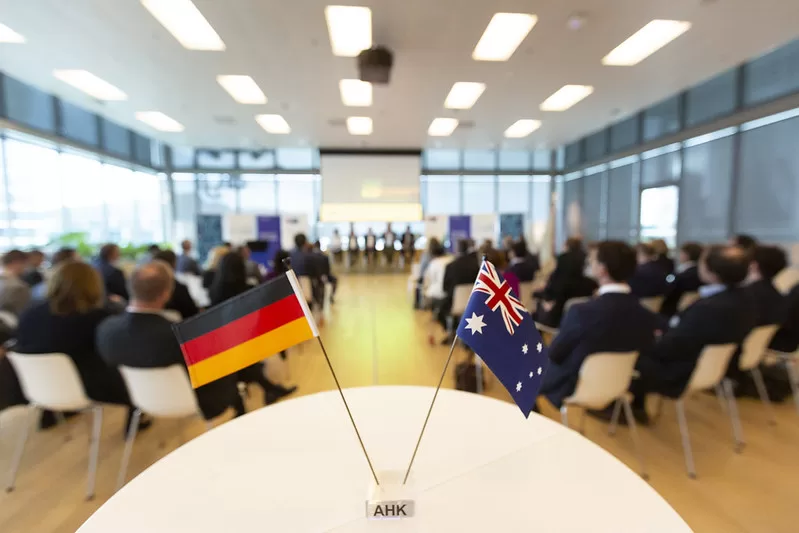Boettcher Law and the Commitment to Sustainable Energy Law Developments
In our ongoing endeavour to navigate the intricacies of Energy Law, we, at Boettcher Law, were excited to participate in the engaging Mid-Year Energy Cluster Lunch. Our deepest gratitude goes out to the German-Australian Chamber of Commerce for organising this amazing event.
Examining the ‘State of Play of Batteries’ within the Energy Law Context

The focus of the event was the ‘State of Play of Batteries’, a subject that is rapidly gaining momentum in Energy Law and our collective endeavour towards more sustainable and efficient energy solutions. The exceptional turnout and the rich discussion that ensued underscored the critical relevance of this topic.
Navigating the Legal Labyrinth of Battery Technology in Energy Law
Battery technology, as an essential component of the evolving energy landscape, brings with it a host of legal implications that require careful examination. The shift towards battery-based energy storage systems comes with a unique set of legal challenges that call for robust solutions.
On one hand, these challenges revolve around safety concerns, including fire hazards and noise pollution, which could lead to significant legal disputes. With communities becoming increasingly involved in these projects, regulatory compliance around health and safety standards gains precedence. Energy Law, in this context, must be adaptive and proactive, able to navigate these nuanced scenarios to protect stakeholder interests.
On the other hand, property rights and land use policies for battery installation sites can prove to be a complex area within Energy Law. As jurisdictions worldwide grapple with these issues, we are exploring the potential for creating fair and sustainable frameworks that balance both private and public interests.
Redefining Energy Law: Addressing the Legal Aspects of Battery Sourcing, Disposal, and Sustainability
Additionally, the increasing importance of batteries in our energy mix raises pertinent questions around the sourcing and disposal of materials. Regulations regarding the mining of critical minerals, the establishment of comprehensive recycling systems, and the creation of sustainable manufacturing practices will form an important part of the Energy Law discourse.
These legal challenges, though substantial, are also a gateway to a plethora of opportunities. The advent of batteries and their role in achieving energy goals is shaping a new frontier in Energy Law. This transformation offers the chance to redefine regulations, innovate legal practices, and, ultimately, drive our sustainable future.
The conversation at the Mid-Year Energy Cluster Lunch, hence, didn’t merely attest to the importance of batteries in our energy future; it highlighted the crucial role of legal innovation in advancing this sector. The insights and experiences shared will undoubtedly contribute to the continued evolution of Energy Law in the face of these challenges and opportunities.
Keynote Address and the Impact on Energy Law from Victoria’s Accelerated Net-Zero Timeline
Victoria’s Accelerated Net-Zero Goal: Implications and Evolution for Energy Law
Minister D’Ambrosio announced a significant shift in Victoria’s climate policy – the acceleration of the state’s net-zero emissions goal from 2050 to 2045. This ambitious adjustment, a forward-thinking move, harmonizes Victoria’s climate strategy with Germany’s progressive approach. It underscores the importance of synchronizing international efforts and policies to achieve global sustainability goals effectively.
However, this accelerated timeline isn’t just about setting a bold goal – it carries profound implications for Energy Law. The shift towards an earlier net-zero target necessitates a rapid and more radical transformation in energy production and consumption patterns. Consequently, it also demands an evolution in Energy Law to govern and facilitate these changes effectively.
The legislative and regulatory frameworks would need to be re-examined and amended, giving rise to new standards, obligations, and potentially, novel legal structures. This transformation extends to a diverse array of sectors, including transportation, manufacturing, construction, and particularly, the energy sector itself. It is here that the ‘State of Play of Batteries’ becomes an especially pertinent topic, as batteries will inevitably play a pivotal role in this transition.
Bilateral Collaboration in Energy Law: German-Australian Chamber of Commerce’s Influence and Boettcher Law’s Commitment
Furthermore, Minister D’Ambrosio acknowledged the influential role that the German-Australian Chamber of Commerce plays in these critical developments. This affirmation demonstrates the importance of transnational collaboration in shaping climate and Energy Law policies. It also exemplifies the opportunities for shared learning, policy exchange, and cooperation that such bilateral relationships provide.
As Boettcher Law, we recognise the significant impact these changes will have on our clients and our legal practice. Rest assured, we remain committed to staying abreast of these developments, interpreting their implications, and advising our clients accordingly.
Commitment to Greener Future: Energy Law’s Role

The overwhelming response to the Mid-Year Energy Cluster Lunch reflected the collective commitment to a greener, more sustainable future.
Energy Law: An Evolving Discipline Guiding the Transition to Sustainable Energy
At the heart of this dedication lies Energy Law, a discipline that is rapidly evolving to address the complex legal challenges arising from our transition to renewable energy sources, such as battery technology. Energy Law not only provides the regulatory foundation that underpins these changes but also serves as a crucial tool to guide the energy transition and address any conflicts that arise along the way.
Whether it’s negotiating the legal intricacies of land use for battery installation, addressing safety concerns, or dealing with the implications of critical mineral mining, Energy Law plays a pivotal role. It aids in navigating the complex legal landscape that comes with such an ambitious transition, setting the groundwork for regulation, enforcement, and dispute resolution.
Boettcher Law’s Dedication to Navigating the Evolving Landscape of Energy Law towards Sustainability
This event was not just an opportunity to share insights and knowledge but also a testament to the growing awareness of Energy Law’s essential role in our journey towards a sustainable future.
At Boettcher Law, we understand the significant influence these developments will have on our practice, our clients, and society at large. As such, we remain dedicated to staying at the forefront of Energy Law, contributing to the discourse, and guiding our clients through the evolving legal landscape towards a greener future.

At Boettcher Law, we take pride in our team of dedicated professionals who are not just well-versed in their fields but are also passionate about creating a sustainable future. One such expert is Mason Keene-McCann, a distinguished solicitor from our Melbourne office.
Mason, along with the team at Boettcher Law, is ready to assist you in navigating the complexities of Energy Law. We invite you to reach out to us at Boettcher Law for more information, insights, or advice related to Energy Law and its developments.